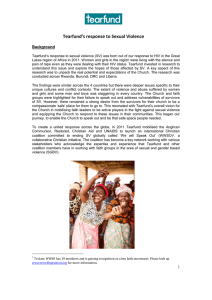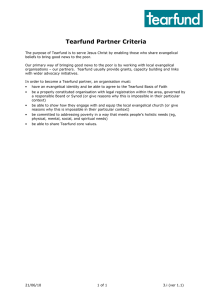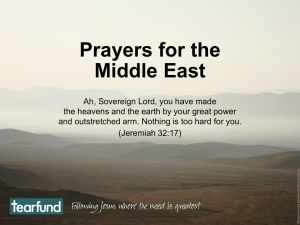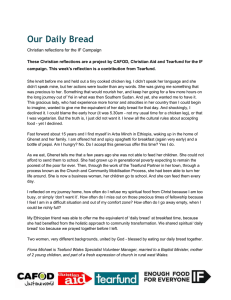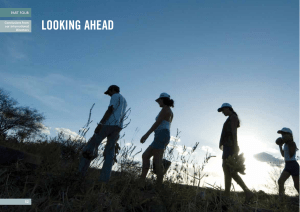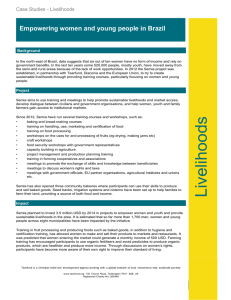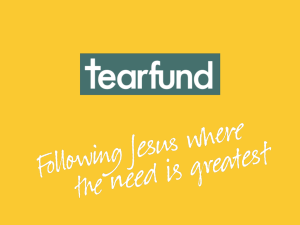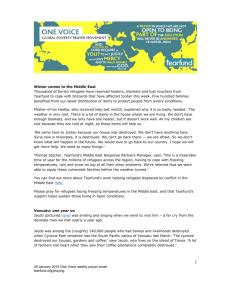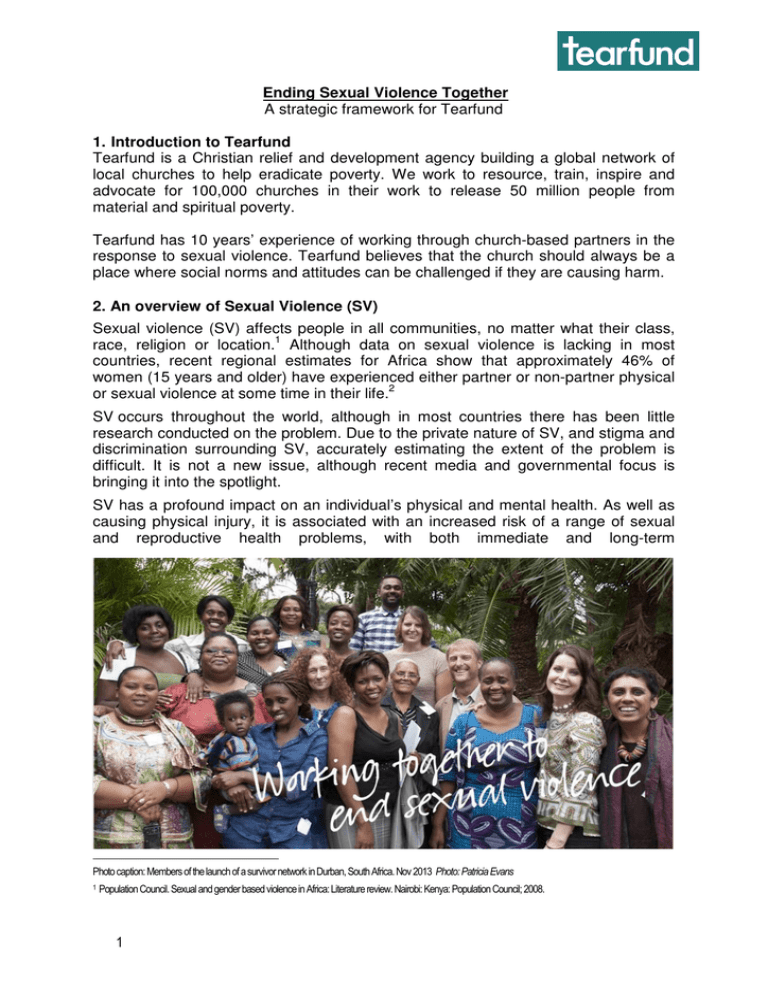
Ending Sexual Violence Together
A strategic framework for Tearfund
1. Introduction to Tearfund
Tearfund is a Christian relief and development agency building a global network of
local churches to help eradicate poverty. We work to resource, train, inspire and
advocate for 100,000 churches in their work to release 50 million people from
material and spiritual poverty.
Tearfund has 10 years’ experience of working through church-based partners in the
response to sexual violence. Tearfund believes that the church should always be a
place where social norms and attitudes can be challenged if they are causing harm.
2. An overview of Sexual Violence (SV)
Sexual violence (SV) affects people in all communities, no matter what their class,
race, religion or location.1 Although data on sexual violence is lacking in most
countries, recent regional estimates for Africa show that approximately 46% of
women (15 years and older) have experienced either partner or non-partner physical
or sexual violence at some time in their life.2
SV occurs throughout the world, although in most countries there has been little
research conducted on the problem. Due to the private nature of SV, and stigma and
discrimination surrounding SV, accurately estimating the extent of the problem is
difficult. It is not a new issue, although recent media and governmental focus is
bringing it into the spotlight.
SV has a profound impact on an individual’s physical and mental health. As well as
causing physical injury, it is associated with an increased risk of a range of sexual
and reproductive health problems, with both immediate and long-term
Photo caption: Members of the launch of a survivor network in Durban, South Africa. Nov 2013 Photo: Patricia Evans
1
Population Council. Sexual and gender based violence in Africa: Literature review. Nairobi: Kenya: Population Council; 2008.
1
consequences. Its impact on mental health can be as serious as its physical impact,
and may be equally long lasting. Deaths following sexual violence may be as a result
of suicide, HIV infection or murder – the latter occurring either during a sexual
assault or subsequently, as a murder of ‘‘honour’’. Sexual violence can also
profoundly affect the social wellbeing of victims; individuals are often stigmatised and
ostracised by their families and others as a consequence.
Sexual violence is defined as: “Any sexual act, attempt to obtain a sexual act,
unwanted sexual comments or advances, or acts to traffic, or otherwise directed,
against a person’s sexuality using coercion, by any person regardless of their
relationship to the victim, in any setting, including but not limited to home and work.“3
SV is a form of gender based violence (GBV), which is violence that is directed
against a person on the basis of gender or sex.
3. Tearfunds strategy
Tearfunds began responding to sexual violence (SV) in 2011. What started as a pilot
initiative has grown into a serious response with a wide range of partners, strategic
allies and stakeholders across 6 countries to date, with plans to expand to a further 3
countries in 2014. Current focus countries are: Rwanda, Burundi, Democratic
Republic of Congo, Liberia, Tanzania (with a focus on FGM/C) and South Africa.
New countries will include Central African Republic, South Sudan and Haiti (tbc).
In 2011, Tearfund founded an international Christian coalition committed to ending
SV globally called ‘We Will Speak Out’ (WWSO). The coalition has become a key
network working with various stakeholders who acknowledge the expertise and
experience that Tearfund and other coalition members have in working with faith
groups in the area of sexual and gender based violence (SGBV). WWSO is a key
aspect of Tearfund’s response to SV.
Tearfund’s strategic framework has the following aims:
Overall Goal: By 2018, end sexual violence in 150 communities across 15 countries.
Purpose: Churches will play a key role in supporting survivors and ending sexual
violence.
Key Outcomes:
1.
Faith communities will speak out and act
2.
3.
Churches become safe spaces
Survivor movements will influence policy and practice
4.
5.
Men and boys will be involved in preventing SV and promoting gender equality
Good practice responses to SV established in the humanitarian sector
2 WHO, LSHTM, MRC. Global and regional estimates of violence against women: Prevalence and health effects of intimate partner violence and non-partner
sexual violence. WHO; 2013.
3 WHO, 2002
2
4. Progress to date
OUTCOME 1: 468 Faith communities are
speaking out and acting
There is tremendous momentum among churches
across the 6 countries Tearfund is currently involved
in (Rwanda, Burundi, DRC, Tanzania, South Africa
and Liberia). The Anglican Archbishops have been
the key Champions in all countries except Liberia
(where the Anglican church has a smaller
presence).
Church leaders in the countries span various
denominations. Unlike the struggle we had with HIV
in the early years, key stakeholders like the
government, UN and other agencies are keen to
work with religious leaders in addressing SV.
Tearfund’s key contribution has been in the
following ways:
● As a catalyst, mobilising faith leaders and
Champions at international, national and local level
● Establishing partnerships with UNAIDS and other
key stakeholders as advisory members in the national responses
● Research into role of the church and the needs and priorities of survivors
● Developing a church SV resource and tool kit, integrating SV, including Female
Genital Mutilation and Cutting (FGM/C) into church mobilisation processes to
mobilise and train church leaders.
Please refer to detailed information on national
responses at www.wewillspeakout.org. Tearfund will
be expanding this work into South Sudan and CAR
over the next 6 months.
Archbishop Henri Isingoma of DRC
signing the WWSO pledge
Photo: Maggie Sandilands/ Tearfund
OUTCOME 2: Churches become safe spaces across 87 communities
Churches are becoming safe spaces in 3 ways:
● For survivors to find care and support.
● For deep conversations and reflections on reshaping masculinities.
● For practical support to advocate for justice and thereby end impunity.
Each Church explores what being a safe space means in their context, in response
to what survivors are asking for. An example is in SA, Tearfund has become a
member of the KZN provincial Government’s Victim Empowerment Forum (VEF).
This will help Tearfund facilitate relationships between key governmental
departments and Churches in the communities so that an effective safety net can be
3
put in place to prevent SV and provide effective care for survivors. A document of
case studies can be found on the WWSO website. These have been used in key
meetings with donors and key stakeholders on board in Rwanda and Burundi
thereby paving the way for in country funding partnerships.
OUTCOME 3: 2 survivor movements involving 125 survivors will influence
policy and practice
A systematic mapping of survivor needs and priorities has been completed in two
countries; South Africa and the Democratic Republic of Congo (DRC), to inform
context-specific responses. Survivor peer support groups are being formed and the
groups are being mentored so that they can become powerful advocates shaping
understanding and practical action in their communities.
The first survivor movement was launched in Durban, South Africa, with 37 survivors
and they broke their silence by speaking to Church leaders in November 2013. The
Minister for Women, Children and people with Disabilities, Lulu Xingwana, committed
to meeting with the survivors to hear their priorities.
OUTCOME 4: 610 men and boys are involved in preventing SV and promoting
gender equality
Baseline studies on men, faith and concepts of masculinity, to understand the
context for addressing the role of men and boys in prevention and response to SV
and promotion of gender equitable relationships, were carried out in Rwanda,
Burundi and DR Congo. 610 men and 623 women were part of this exercise. The
information from these studies is being used to work with men and boys on context
specific interventions focusing on positive masculinities.
OUTCOME 5: Good practice responses to SV established in the humanitarian
sector
Tearfund is now beginning to pilot the integration of specific SV responses into
humanitarian response. In 2013, Tearfund held a first meeting to explore interest
among humanitarian actors on working with faith groups to integrate SV responses
within emergencies. 21 global agencies participated in the meeting, expressing
interest to work together.
In May 2014, Tearfund organised a 3-day reflective process in Bangui, Central
African Republic (CAR), which brought together different faith groups, local and
international NGOs, UN agencies and representatives from government ministries
and judiciary, to reflect on the issue of SV within the current conflict in CAR.
Participants mapped current responses, identified gaps, and worked together to plan
a stronger collaborative response. The Gender-based Violence sub-Cluster in
Bangui helped Tearfund to facilitate the workshop, ensuring coordination with
existing actors and services. Tearfund plans to begin supporting survivor mapping
and trainings with faith leaders in CAR in 2014, as well as expanding these pilot
responses to South Sudan later in the year.
4
5. Strategic Partners
Tearfund believes in the strength of partnerships, recognising the added value of
coordination, diversity, reach and influence. With the credibility and track record built
through its response to HIV (2005 to present), Tearfund has been able to develop
these relationships to focus on SV, working with the following strategic partners:
A. ANGLICAN COMMUNION
The Communion brings strength, diversity and influence across many countries. As
the founding member of the WWSO coalition, Tearfund works with the Communion,
Archbishops and their wives in most affected countries. Tearfund supports the
Archbishops in building a leadership initiative that mobilises other key faith leaders,
and together they develop and implement a national plan of action. Tearfund also
works to mobilise the wives of key denominational leaders across Africa who can
explore deeper issues related to gender and the role women can play in ending SV.
B. UN AGENCIES
UNAIDS have been a very supportive ally in the work at both the international and
national levels. They have been the convening partners bringing on board all other
UN agencies. They are involved in the development of the national plans. They also
support partners with resources and skills. Key aspects of partnership include:
• Speaking out and sharing examples of collaboration with faith groups
• Providing connections for advocacy and in country support
• Technical support for strategy development and research.
• Partner for in country launch events
• Support to access funding
UNFPA is keen to engage with Tearfund in reshaping the overall strategy for
mobilising faith leaders to end female genital mutilation/cutting (FGM/C). UNFPA
hosted a stakeholder event with Tearfund for this purpose in Tanzania in Sept. 2013.
UNWomen is funding survivor mapping research at the national level in South Africa.
Tearfund partner, the Anglican Province of Burundi, co-hosted a Burundi
Governmental Meeting at the UN CSW in March 2013 on the integral role of the
church in ending SV in Burundi.
C. ‘WE WILL SPEAK OUT’ COALITION
Website: www.wewillspeakout.org
Tearfund was a key founder of the coalition in 2011, mobilising the Anglican
Communion, Restored, Christian Aid and UNAIDS to launch a collaborative faith
initiative working to end sexual violence. We Will Speak Out (WWSO) is now a
global coalition of Christian-based NGOs, churches and organizations, supported by
an alliance of individuals, who together commit themselves to see the end of sexual
violence across communities around the world. The coalition partnership works
together to harness efforts to prevent and eliminate sexual violence by supporting
5
the church to speak out against sexual violence, show strong and positive leadership
and become a ‘safe’ place for people to go to. The coalition now comprises 17
members and strategic partners, with ‘sister’ coalitions in the USA, South Africa and
DRC. Tearfund holds the role of the Steering Group Chair and Secretariat.
WWSO Vision: Transformed, just and reconciled communities where the lives of
men and women, girls and boys are no longer shattered by gender based violence.
WWSO Goal – by end of 2016: Church communities and leaders – male and
female – are proactively working with survivors and others, to address effectively the
causes and consequences of sexual violence, including within the church.
The coalition to date
has come together
primarily to work on
key events like
UNCSW 2013,
International AIDS
Conference 2013 and
the ESVC Global
Summit 2014. The
website offers a
platform to share
learning and
resources.
The UK High Commissioner for South Africa, Baroness Scotland, and Minister for
Gender South Africa signed WWSO Pledge cards on International Women’s Day
2014, in Cape Town, South Africa. Photo: Veena O’Sullivan, Tearfund
D.SEXUAL VIOLENCE RESEARCH INITIATIVE (SVRI)
The SVRI is a global research initiative, pulling together all the research done in the
area of SV. They are a powerful, uniting force that hosts a conference every two
years where papers are launched and partnerships are brokered. Tearfund has a
good relationship with SVRI, and has been asked to facilitate the Faith forum.
• In September 2013, an online faith forum was launched within the Sexual
violence research initiative (SVRI). This is moderated by Tearfund.
•
In October 2013, Tearfund co-hosted a meeting with UNAIDS & UNFPA to
develop good practice standards for the faith community in SV.
E. SONKE GENDER JUSTICE
Sonke are a South African NGO working across various countries, with an incredible
track record in innovative work on issues of masculinities. Sonke have worked with
faith communities on SV issues and developed a really strong process to bring men
on board. Sonke support Tearfund partners and churches explore positive and
harmful masculinity constructs and explore a reshaping of positive male role models.
6
F. JOINT LEARNING INITIATIVE (JLI)
Website: www.jliflc.com
The Joint Learning Initiative (JLI) is a ground-breaking international collaboration
working to develop robust, practical evidence and actionable policy and
programmatic recommendations on the role of local faith communities (LFCs) in
community health and development. Tearfund (Veena O’Sullivan) is the co-chair of
the newly launched Sexual and Gender Based Violence (SGBV) Learning Hub within
the JLI. This is a strategic role, coordinating learning around SGBV responses, with
the potential to build and share an improved evidence base for the role of faith.
G. UK GOVERNMENT
The British government, with its commitment to ending violence against women and
girls, is a key and valued strategic partner for Tearfund. Tearfund works with both the
Department for International Development (DfID) and the Foreign and
Commonwealth Office (FCO).
Tearfund’s work with local partners in DRC has been funded by DfID’s Global
Poverty Action Fund (GPAF) and Challenge fund, and Tearfund is now a recipient of
FCO funding administered as part of William Hague’s ‘Prevention of Sexual Violence
Initiative’ (PSVI). This project focuses on mobilising faith groups in the DRC, working
through the Anglican Church of Congo, and is strengthening Tearfund’s work and
relationship with the FCO both in Kinshasa and in London. The launch of We Will
Speak Out –DRC was attended by the UK Ambassador in Kinshasa, and in February
2014, the Archbishop of Canterbury and UK Minister for Africa, Mark Simmonds
visited the PSVI project, engaging with the potential role of the church in prevention
and response to sexual violence in conflict-affected communities.
WWSO worked in partnership with the UK Foreign and Commonwealth Office to
consult on the Ending Sexual Violence in Conflict (ESVC) Global Summit in June
2014, particularly for facilitating events around meaningfully engaging faith leaders.
H. OVERSEAS GOVERNMENTS
Tearfund works in partnership with national governments to ensure that church
strategies and implemented programmes support the national governments Action
Plans and strategy to end violence against women. This includes working with the
Ministry of Gender, Ministry of Justice and also independent commissions, such as
the Commission for Gender Equality in South Africa which funded and partnered with
Tearfund to launch a survivor movement in South Africa.
7
Tearfund
HIV & SV Unit
Contact: Veena O’Sullivan
Email: veena.osullivan@tearfund.org
UK phone number: +44 (0)208 943 7821
All Tearfund reports are available to download at: www.tearfund.org/sexualviolence
8

